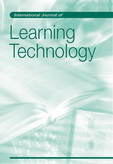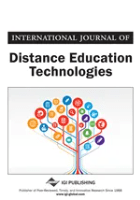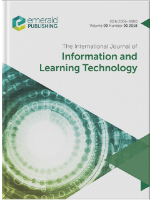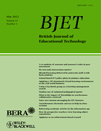
Smart Learning Environments
Scope & Guideline
Fostering collaboration in smart learning research.
Introduction
Aims and Scopes
- Integration of Smart Technologies in Education:
The journal emphasizes the use of smart technologies, such as artificial intelligence, augmented reality, and virtual reality, to create more engaging and effective learning environments. - Pedagogical Innovations:
It explores new teaching methodologies, including adaptive learning, gamification, and inquiry-based learning, aimed at improving student engagement and learning outcomes. - Data-Driven Decision Making:
Research in the journal often involves the application of learning analytics and educational data mining to inform teaching practices and improve student performance. - Focus on Diverse Learning Environments:
The journal covers a range of educational contexts, from K-12 to higher education, and addresses various learning modalities, including online, blended, and face-to-face learning. - Student-Centered Learning:
There is a strong emphasis on understanding and enhancing student experiences, promoting self-regulated learning, and fostering student agency in the learning process.
Trending and Emerging
- Artificial Intelligence in Education:
There is a notable increase in research focusing on the application of AI technologies, particularly generative AI tools like ChatGPT, in enhancing learning experiences and supporting educators. - Augmented and Virtual Reality:
The integration of AR and VR technologies is becoming a more prominent theme, with studies exploring their effectiveness in creating immersive learning experiences that enhance engagement and understanding. - Collaborative and Peer Learning:
Emerging research highlights the importance of collaborative learning experiences, particularly in remote and hybrid environments, with a focus on how technology can facilitate peer interactions. - Digital Literacy and Competence Development:
As digital tools become ubiquitous, there is an increasing emphasis on developing students' digital literacy skills and competencies necessary for navigating modern educational landscapes. - Well-Being and Psychological Aspects of Learning:
Recent studies are beginning to explore the psychological well-being of students in smart learning environments, addressing the emotional and cognitive impacts of technology on learning outcomes.
Declining or Waning
- Traditional Classroom Pedagogy:
There appears to be a diminishing focus on conventional teaching methods that do not incorporate technology or innovative approaches, as the journal increasingly emphasizes smart and adaptive learning environments. - General Educational Software Evaluation:
Research centered solely on evaluating generic educational software without a focus on its integration into smart learning environments or specific pedagogical frameworks is less prevalent. - Non-Smart Learning Frameworks:
Themes that do not align with the smart learning paradigm, such as purely theoretical discussions without practical applications, are becoming less common as the journal seeks to highlight effective, technology-enhanced practices.
Similar Journals

Journal of E-Learning and Knowledge Society
Exploring the Future of Learning in a Connected WorldJournal of E-Learning and Knowledge Society is a premier academic journal dedicated to the exploration and advancement of e-learning and knowledge dissemination in contemporary society. Published by the SOC ITALIANA E-LEARNING, this journal has established itself as a vital resource for researchers and practitioners since its inception in 2006. With an open access model adopted in 2007, the journal promotes the free exchange of ideas and research findings, ensuring wide accessibility to academic contributions in this rapidly evolving field. The journal is indexed in notable databases and holds a Q3 classification in both Computer Science Applications and Education, reflecting its significant role in the advancement of educational technologies. Furthermore, its Scopus ranks highlight its relevance within the educational and computer science communities. Based in Rome, Italy, the Journal of E-Learning and Knowledge Society aims to bridge the gap between theory and practice, providing a platform for innovative research that shapes the future of digital learning environments. Whether you are a researcher, educator, or student, this journal offers valuable insights and developments in e-learning that are critical to navigating today’s knowledge society.

Journal of Teaching and Learning
Advancing educational excellence through innovative research.The Journal of Teaching and Learning, published by the University of Windsor, Faculty of Education, is a prominent open-access journal in the field of education, dedicated to fostering scholarly discussion and exploration. Since its inception in 2001, it has served as a vital platform for researchers, educators, and practitioners to share innovative insights and evidence-based practices that advance teaching and learning methodologies. With an impact factor reflective of its category quartiles, it currently ranks in the Q3 category for education according to the 2023 evaluation, standing at 834 out of 1543 in Scopus's social sciences education rankings. This journal aims to bridge theoretical frameworks with practical applications, providing a robust resource for those invested in enhancing educational outcomes. With an open-access model, the Journal of Teaching and Learning ensures that its contributions are readily accessible to a global audience, encouraging the dissemination of knowledge and collaborative learning experiences. The journal is published in Canada and welcomes submissions that explore current trends and future directions in teaching practices, learner engagement, and educational policy.

International Journal of Learning Technology
Unlocking the Potential of Technology in Education.Welcome to the International Journal of Learning Technology, a premier platform for scholarly discourse published by InderScience Enterprises Ltd. Operating from Switzerland, this journal delves into the innovative intersections of technology and education, offering insights and research findings that are vital for educators, researchers, and technology developers alike. With an ISSN of 1477-8386 and an E-ISSN of 1741-8119, the journal maintains a commitment to advancing the field through rigorous peer-reviewed articles. As of 2023, it is categorized in the Q4 quartile for both Education and E-learning within Scopus, currently ranked #1051 out of 1543 in the Educational Social Sciences domain. Though it operates under a traditional subscription model, the journal is dedicated to broadening access to its content, ensuring that cutting-edge research reaches a diverse audience. The International Journal of Learning Technology is particularly valuable for its focus on practical applications and transformative learning experiences, catering to the needs of a rapidly evolving educational landscape. Join our community of thought leaders as we explore the future of learning in a technology-driven world.

International Journal of Distance Education Technologies
Transforming Distance Education Through Innovative ResearchInternational Journal of Distance Education Technologies is a premier scholarly publication, serving as a vital resource for researchers, educators, and technology professionals focused on the evolving field of distance education. Established in 2003 and published by IGI Global, this journal addresses the intersection of educational methodologies and technological advancements, contributing significantly to knowledge in areas including e-learning, computer networks, and education sciences. With notable rankings in the 2023 quartiles, it stands out at Q1 in Education and Q2 in categories such as Computer Networks and Communications and E-learning, reflecting its influence and reach within the academic community. This journal not only provides a platform for high-quality research but also engages with contemporary issues in technology-enhanced learning, making it indispensable for anyone striving to understand and innovate in distance education. Although it does not feature Open Access options, the journal’s rigorous peer-review process ensures that each published article offers valuable insights and relevant findings in this rapidly evolving domain.

ETR&D-EDUCATIONAL TECHNOLOGY RESEARCH AND DEVELOPMENT
Innovating Education: Bridging Theory and PracticeETR&D - Educational Technology Research and Development, published by Springer, is a premier journal dedicated to advancing the field of educational technology through rigorous research and development. With a history dating back to 1957, it has established itself as a leading resource for scholars and practitioners, maintaining a remarkable Q1 ranking in Education as of 2023, and standing at an impressive 41st out of 1543 in the Scopus rankings for Social Sciences - Education, placing it in the 97th percentile. This journal aims to bridge the gap between theory and practice, offering in-depth insights into the latest innovations and methodologies in educational technology. As a vital resource for researchers, educators, and technology developers, ETR&D highlights the interplay of technology, pedagogy, and learning environments, driving the evolution of educational practices in a digital era. Although not an open access journal, it provides comprehensive access options for institutional and individual subscribers, ensuring that key findings reach a broad audience. Discover the future of education through ETR&D's influential publications.

International Journal of Mobile Learning and Organisation
Innovating Educational Practices with Mobile TechnologyInternational Journal of Mobile Learning and Organisation, published by InderScience Enterprises Ltd, is a premier academic journal focused on the intersection of mobile technology and educational practices. With an ISSN of 1746-725X and an E-ISSN of 1746-7268, this journal has been a vital resource since its inception in 2007, exploring innovative approaches to mobile learning and organizational development with a converged publication timeline extending to 2024. The journal holds a respectable impact in various disciplines, categorized in Q3 for Computer Science Applications and Q2 for both Education and E-learning as of 2023, showcasing its relevance in critical academic discussions. Ranked in the 75th percentile for Educational Social Sciences and the 52nd percentile in Computer Science, it serves as a bridge for researchers, professionals, and students eager to advance their understanding and application of mobile learning techniques. Although it does not provide open access, the journal is recognized for its rigorous peer-review process, ensuring the publication of high-quality research that contributes to the landscape of educational technology.

Australasian Journal of Educational Technology
Pioneering Research for a Digital Learning RevolutionAustralasian Journal of Educational Technology (AJET), a premier peer-reviewed journal published by the Australasian Society for Computers in Learning in Tertiary Education (ASCILITE), has been at the forefront of advancements in educational technology since its inception in 1985. With an impressive Q1 ranking in both Education and E-learning categories for 2023, this open access journal (ISSN: 1449-3098, E-ISSN: 1449-5554) serves as a vital platform for researchers, practitioners, and students aiming to disseminate innovative research and practices in the use of technology for teaching and learning in tertiary education. Based in Australia and accessible to a global audience, AJET is committed to enhancing educational outcomes through the integration of technology, fostering a vibrant community of scholarship and collaboration among educators and industry professionals. With its high impact ranking (Rank #105/1543 in Social Sciences - Education), AJET remains a significant contributor to the scholarly discussion on effective learning environments in an increasingly digital world.

Technology Knowledge and Learning
Advancing the Intersection of Technology and EducationTechnology Knowledge and Learning, published by SPRINGER, stands as a pivotal platform in the realms of computational theory, computer science, education, and human-computer interaction. With an impressive impact factor reflecting its reputation, this journal has consistently ranked in the Q1 quartile across multiple categories as of 2023, including Computational Theory and Mathematics, Education, and Engineering. Spanning a timeline from 2011 to 2024, it serves as an essential resource for those engaged in exploring the intersections of technology, pedagogy, and knowledge transfer, thereby facilitating advancements in both theory and practical applications. Although it is not an open-access journal, the rigorous peer-review process ensures that only the highest quality research contributes to its esteemed reputation. By providing a platform for innovative research and discussions, Technology Knowledge and Learning plays a crucial role in shaping the future of technological education and applications, making it an invaluable resource for researchers, professionals, and students alike, seeking to stay at the forefront of this dynamic field.

International Journal of Information and Learning Technology
Transforming Education with Insightful Technology StudiesInternational Journal of Information and Learning Technology is a pivotal publication in the fields of computer science and education, published by the esteemed Emerald Group Publishing Ltd. With an ISSN of 2056-4880, this journal has positioned itself as a valuable resource, reflecting a commitment to high-quality research and discourse in information technology and learning methodologies. Recognized for its significant contributions, it holds a respectable Q2 ranking in both Computer Networks and Communications and Computer Science Applications, along with a prestigious Q1 ranking in Education for the year 2023. The journal spans an expansive converged period from 2015 to 2024, providing an extensive archive of innovative ideas and findings that are instrumental to researchers, educators, and IT professionals alike. Although currently not open access, the publication remains vital to the academic community, ensuring that cutting-edge research and discussions continue to inform and inspire advancements in the integration of technology within learning environments. From its base in Leeds, United Kingdom, the journal invites submissions that explore the nexus of technology and education, fostering a deeper understanding of how digital innovations can enhance teaching and learning experiences.

BRITISH JOURNAL OF EDUCATIONAL TECHNOLOGY
Transforming Education through Cutting-Edge ResearchBRITISH JOURNAL OF EDUCATIONAL TECHNOLOGY, published by Wiley, is a leading journal in the field of educational technology, recognized for its commitment to advancing research and practice in this dynamic arena. With an impressive impact factor that places it in the Q1 quartile for both Education and E-learning in 2023, it serves as a critical resource for academics, practitioners, and policymakers alike. This journal, with an established publication history since 1970, focuses on the integration of technology in educational settings, aiming to disseminate innovative findings and facilitate discussions that enhance learning experiences. Researchers contributing to the journal address diverse topics from digital learning environments to the pedagogical implications of emerging technologies, ensuring comprehensive coverage of the latest trends and methodologies. Submissions are welcomed in various formats, promoting collaborative scholarly dialogue in fostering effective educational practices. Access to the journal is available through traditional subscription frameworks, ensuring broad accessibility for institutions and individuals invested in the advancement of educational technology.